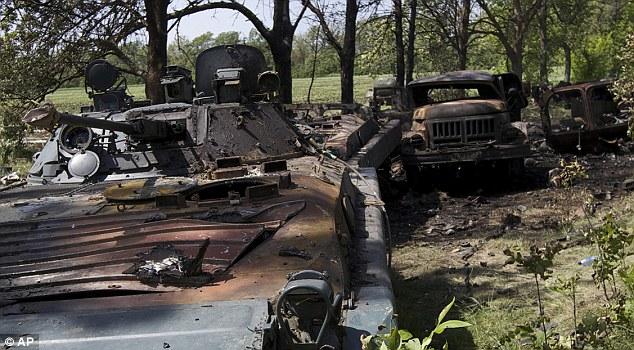
UKRAINE RISK BAIL OUT

The International Monetary Fund on Wednesday approved a bigger, high-risk bailout for Ukraine, giving Kiev immediate access to $5 billion of $17.5 billion in emergency IMF credit in another bid to keep the embattled country afloat.
Ukraine's deadly conflict with Russia-backed militants in eastern Ukraine forced the fund to revamp its bailout program as the turmoil pushed the economy into a deep, two-year contraction, fueled a currency free fall, sparked rampant inflation and drained the central bank's reserves.
IMF and Western officials now hope that a fragile cease-fire combined with painful budget-tightening and a host of economic overhauls will restore the country's finances and growth outlook. The fund bailout is part of a larger, $40 billion international package that includes a yet-to-be-negotiated restructuring of some of Ukraine's debt.
"This new four-year extended arrangement will support immediate economic stabilization in Ukraine and a set of deep and wide-ranging policy overhauls aimed at restoring robust growth," IMF Managing Director Christine Lagarde said in a statement.
Ukrainian Finance Minister Natalie Jaresko said the IMF's approval triggers more aid from the World Bank, the European Bank for Reconstruction and Development, the U.S. and other Western lenders.
"The program is subject to exceptional risks, especially those arising from the conflict in the east," said David Lipton, the IMF's No. 2 official.
The turmoil has slashed revenue, ramped up military spending and destroyed infrastructure in critical manufacturing regions. The IMF said it expects the economy to contract by 5.5% this year before a tentative 2% rebound next year. But if fighting erupts anew and continues to strain the country's resources, Ms. Lagarde said it could jeopardize the bailout.
"This year's intensification of the conflict has imposed severe damage on an already fragile economy," Ramin Toloui, U.S. Treasury assistant secretary for international finance, told the SenateForeign Relations Committee on Tuesday. "In view of the inherent uncertainties in the security situation, there continue to be risks."
Underscoring those hazards, the U.S. Treasury earlier Wednesday added several more Russian-backed militants and a Moscow-based bank to its sanctions list, saying that recent assaults by separatists "constitute violations of the letter and spirit" of the peace deal.
And while the U.S., Europe and other Western nations have pledged $7.5 billion in loans and bond guarantees as part of the larger $40 billion international package, the program also assumes creditors will provide $15 billion in debt relief through a restructuring of Kiev's debt. Financiers and market analysts say that is presumptuous given those negotiations haven't even started.
Ukrainian officials have said talks with creditors would begin soon after the IMF approved the bailout program. Mr. Lipton said a "successful" debt restructuring with high creditor participation was necessary for the fund to approve the next tranche of funding due in three months.
Still, the IMF bailout is seen by many economists and analysts as part of a broader political decision to back the fledgling pro-Western government in Kiev. The U.S. and Europe are trying to help the former Soviet republic leave its decadeslong political and economic orbit around the Kremlin.
"The crisis provides an opportunity for the government to make a decisive break from the past," said Mr. Lipton, a veteran crisis-fighter who helped Poland rebuild its economy after it broke from the Soviet Union's grasp a quarter century ago.
It is a precarious effort: Although many economists say the bailout program is vital to improve the country's long-term prospects, in the near term, the painful measures could also exacerbate political tensions in the country.
"Today's IMF decision proves the civilized world believes in and supports Ukraine," President Petro Poroshenko said in a tweet.
Having been burned in previous Ukraine bailouts, the IMF required Kiev to approve tough budget cuts and policy overhauls as preconditions for the bigger bailout. Previous governments have twice failed to honor IMF bailouts, forcing the fund to abandon the programs before they were completed.
"Many key measures are front-loaded under the new program—including further sizable energy tariff increases, bank restructuring, governance reforms of state-owned enterprises and legal changes aimed at combating corruption and strengthening the rule of law," Ms. Lagarde said.
Still, the IMF chief tempered her outlook: "With continued firm implementation, there is reasonably strong prospect of success."
Anders Åslund, a senior fellow at the Peterson Institute for International Economics and former adviser to Ukraine's government, said aside from continued Russian aggression, one of the biggest challenges is in Kiev itself.
"The greatest domestic risk remains corruption," Mr. Åslund said in analysis after the fund's financing approval.
Kiev will have to continue with planned economic overhauls to trigger more IMF cash tranches over the next four years.
wsj.com




